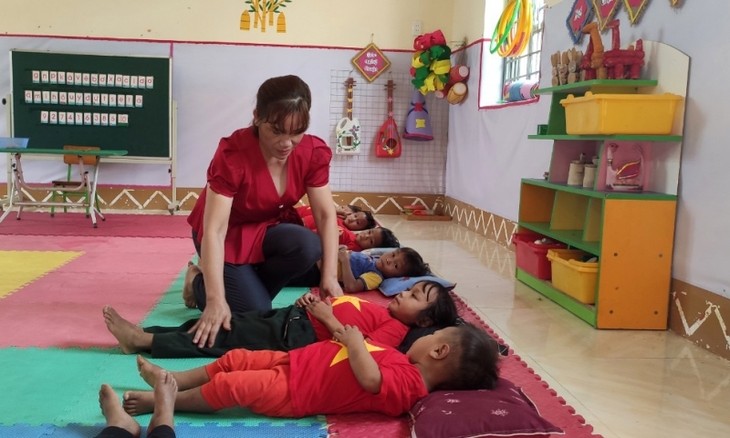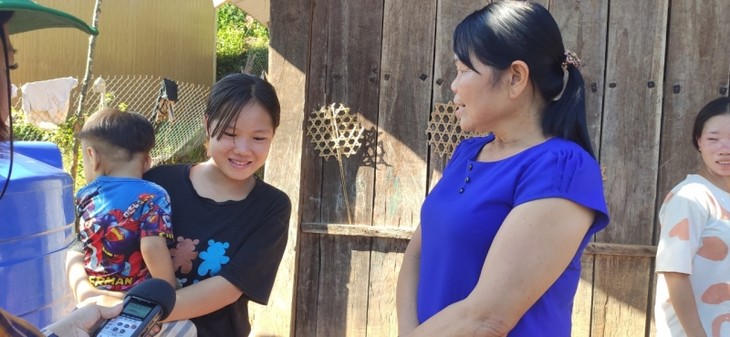(VOVWORLD) - Over the years, generations of lowlander teachers have come to work in Pa U, an extremely difficult border commune in Muong Te district, Lai Chau province. Despite being away from their families, the teachers want to stay and give more learning opportunities to the children in this remote area.
 Ngo Thi Ha has been taking care of La Hu ethnic children in Muong Te district for 17 years. (Photo: VOV) Ngo Thi Ha has been taking care of La Hu ethnic children in Muong Te district for 17 years. (Photo: VOV)
|
Ngo Thi Ha, a teacher at Pa U school, recalled her first days teaching here when everything wasn’t as good as it is now.
“Classrooms were covered with tarpaulins or made of bamboo wattles. In the first month, I lost 10 kilos because of homesickness and missing my children. I thought I couldn't keep working. But the daily activities - picking up children in the morning, feeding them and putting them to sleep - have kept me here for 17 years,” Ha told VOV.
Dinh Thi Thai, another teacher, said she missed her children at home so much but had tried to deal with the situation by telephoning them every day.
“Sometimes I’ve thought that I couldn't endure it. Then my children grew up, went to school, and got a job. Now I feel better about staying with the students here,” said Thai.
After working in Muong Te for decades, preschool teachers like Ngo Thi Ha and Dinh Thi Thai have overcome their feelings about being away from family.
Pa U commune is home to La Hu ethnic people with a poverty rate of more than 80%. In the past, when a new crop season came, the La Hu used to take their children to the fields. Teachers had to wander up hill and down dale looking for their students.
Ha of Phu Tho province, more than 700km from Pa U, has worked at a hamlet facility of the Pa U kindergarten for a long time with her family’s support.
“We’re allowed to visit home for one week during the Tet holiday and during 2 months of summer vacation from June 1 to August 1. All family tasks including my children's studies are done by my husband. Otherwise I couldn’t keep doing this job,” said Ha.
Having lived with the La Hu ethnic group for years, Dinh Thi Thai is familiar with La Hu customs, habits, and language.
The kindergarten facility in Nhu Ma hamlet has more than 30 children. To persuade local parents to send their children to school, Thai and her colleagues regularly organize communications sessions.
 Preschool teacher Dinh Thi Thai (R) convinces a young mother to send her children to school. (Photo: VOV) Preschool teacher Dinh Thi Thai (R) convinces a young mother to send her children to school. (Photo: VOV)
|
Thirty years ago, Thai, a Muong ethnic girl in Hoa Binh province, began teaching in extremely poor border communes in Muong Te district, Lai Chau province.
The poor infrastructure, the lack of electricity, and the thatched schools didn’t discourage teachers like Thai.
“People in a hamlet there live on 4 or 5 hills. There are days when students don’t attend school. We have to go to the fields to convince their parents of the importance of preschool education so they’ll send their children to school again. It’s very hard to get students to come to class, but as teachers we have to try. We consider it a pleasure,” said Thai.
Thanks to teachers like Ha and Thai, Pa U kindergarten has managed to pursuade La Hu ethnic parents to send all their children to school.
Every year, the children receive new warm clothes, textbooks, and pens, donated by the teachers and others. The teachers also provide free lunches for the children.
Ly Sa Pu, a Pa U villager, said, “Lowland teachers live and eat like the locals. The roads are rough, making it hard for traveling. They can only go home in the summer. Few teachers from the plains dare to come work here.”
In recent years no new lowland teachers have come here to work, but those who already work in this difficult border area don’t want to leave. The children’s happiness, study progress, and better lives give them joy.